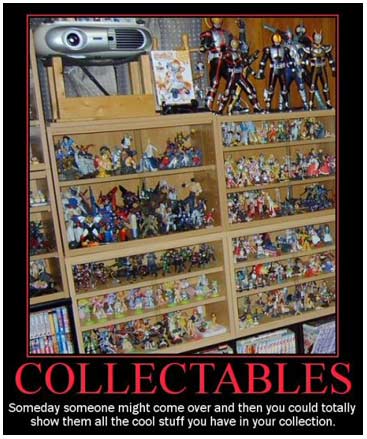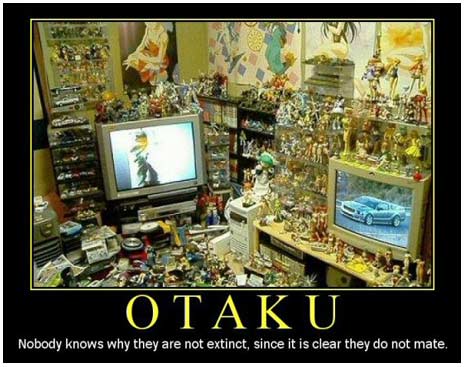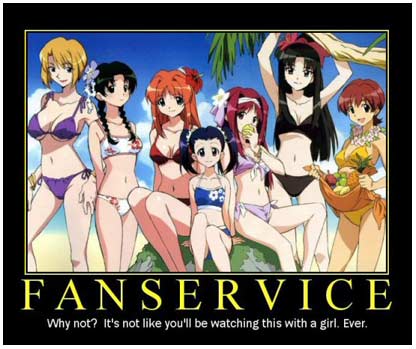by Justin Sevakis (reprinted completely without his permission, solely for the sake of having everything needed to understand the question and response on one page), Nov 25 2007
These are good times to be an anime fan. DVD's have never been cheaper. If you're not into buying DVD's or don't have the money, you can download DVD-quality copies over the internet for free and never have to worry about anything bad ever happening to you, ever.
Consequently, these are downright terrible times for anybody in the anime industry. DVD sales are way down, profits are even lower, and a good number of companies are losing money hand-over-fist. Even in Japan, many productions aren't breaking even. People in both the US and Japan are feeling like it's the apocalypse.
The decline of the anime industry and the influence of fansubs on said decline is probably the most talked-about issue in the scene today. The pros have discussed it worriedly amongst themselves for years, but only recently are they speaking out about its damaging effects. Every time they do, and we post about it here on ANN, there's a firestorm of debate about exactly how bad fans should feel about downloading. Occasionally, industry people will pop in to argue for more guilt.
I understand the panic going on. I've seen the numbers myself. They're terrifying. It's not uncommon now for a DVD to not even make back the cost of the dubbing, let alone the license fee. When only a few years ago it was commonplace for shows to get licensed for $70,000 or more per episode, today a show can be licensed for less than half of that. And they're still not profitable.
Clearly, the business model is failing. People realize this, but nobody's actually doing anything about it. Rather than take decisive action, the industry keeps trying the same things it's been doing for years, and when that inevitably doesn't work, the fans who download are blamed. Which makes sense. After all, they're getting the product but not paying for it. Most people would call that stealing.
Now, if this was something new, perhaps I'd have a little more sympathy when the rights holders cry victim. However, the fansub scene is approaching voting age at this point, and digitally transmitted fansubs started circulating about a decade ago. Every year they've gotten more and more widespread (with the historic popularity of Naruto pushing them into complete prominence). And to date, those rights holders have done very little to stop them. There is now an entire generation of anime fans who have never been forced to pay a single dime to get their anime fix.
I do not blame the fans who download with impunity and don't buy a thing. Their attitudes, while damaging, are simply a reflection of the value of anime, which these days, is about $0.00.
That's right. Anime that has been fansubbed is effectively worthless. It's being given away for free. In terms of supply and demand, there is an infinite supply, and therefore the product is worthless regardless of how many people want it – it's like trying to sell buckets of sea water to people on a beach. The only people who would pay for it are either older fans who are attached to the old ways of consuming media, or worse, are doing so out of charity.
That is the state of this industry. And the companies who depend on anime for their livelihood let this happen.
HOW DID WE GET HERE?
When I was a fansubber back in the VHS days, fansubbers felt lucky if more than a few hundred people saw their fansubs. Copies degraded with every generation, tapes wore out (and never looked great to begin with), and the whole thing was very ephemeral. You had to have connections to get fansubs, or be one of the few that knew how to use the internet to make contact with a distributor. Even if you already had a fansubbed anime when it was licensed, the legal copies were usually far superior in quality.
Digital fansubbing changed everything. Suddenly, an infinite number of very high quality copies could be made. Advances in data compression, computer horsepower and broadband connectivity over the years means that now even the least motivated fan can easily find, in English, whatever new is coming out in Japan merely days after it airs on TV.
The internet, that strange beast that now shapes our modern world, effectively takes distribution out of the hands of the rights holder and puts the consumer in charge. Now, even the smallest release – an airing on a satellite TV channel in a small island country, for example – can be put on the internet and distributed to millions of people, should somebody be motivated enough to upload it. Anime fans, being younger and more technically savvy than most demographics, quickly adopt these new methods. And since the internet is global, so is the fansub market.
That few hundred people from the early days has now become hundreds of thousands of people worldwide. However, fansubs are not like music in that anybody can rip a CD and upload it; they take quite a bit of work (and usually a small group of people) to produce. As those fansub groups have to then upload to everybody else, they should make for an easy legal target.
The domestic distributors, to their credit, have made limited attempts to get shows they've licensed taken offline, but their legal arsenal is limited to a Cease and Desist letter. Many of the more self-serving groups have discovered that these can safely be ignored, and little else will ever happen. Worse, by the time a domestic distributor licenses a show the fansub is likely to have been circulating for months. The damage is already done. With few exceptions, the Japanese side of the industry has not even done this much.
Legal rights, such as copyright to an anime, must be defended if they're to be recognized. Anime has not been defended to any effective degree.
Arthur Smith, president of Gonzo Digital Holdings International, recently compared the downloading of fansubs to breaking into the Apple Store and stealing an iPhone the day before it's released. This is incorrect for several reasons. Debate on physical property versus digital copies aside, if one breaks into an Apple Store, an alarm goes off, the police come, and if you're caught you go to prison. There's also a window and a few locks you'd have to break, and you could injure yourself in the process.
If we're to adjust Smith's statement to be truly factual, downloading a fansub would be something more akin to Apple leaving their entire stock of iPhones on a busy street corner with no locks, no guards, and a big sign that says “iPhone”. If the Apple store manager came in the next day and saw that all of them were stolen, he would file a police report and the police would laugh at him. If he then REFILLED the entire stock, still did not buy any locks or hire any guards (but added a small sign that says “please don't take me”), a couple people might start to feel a little bad, but they're still going to come back for more, and probably bring some friends too. Eventually that Apple store would go out of business, and most people would agree that they deserved to.
The point is this: You can't guilt people into buying something they don't want. If you can't make them want it, you simply don't have a business.
GETTING OUT OF THE RUT
To effectively understand the problem, one must understand two things: why people make fansubs, and why people download fansubs.
People make fansubs for one reason: to share cool new shows they like. (There are other personal reasons, of course, such as improving their Japanese skills and bragging rights.) People watch fansubs because the American releases take years to come out (if they come out at all). Once on DVD, they often have to be bought sight-unseen, which sometimes works for movies on DVD but is an unrealistic commitment for TV series. To younger fans, DVD's are also very expensive.
There is currently no legal way for any of these needs to be met. As the anime industry has not given these customers what they want, these freshly empowered consumers are taking it themselves. Therefore, even if massive, expensive lawsuits were filed against fansubbers, the problem would not stop. Stopping current fansubbers would create a market vacuum. Fans would just find another way (and, as Odex recently discovered, they'd be very angry as well).
Before legal action will be effective, fansubs must be replaced. THERE HAS TO BE A LEGAL, INEXPENSIVE WAY TO WATCH NEW ANIME IN ENGLISH. Not necessarily own, but at least watch.
ADV Films and Funimation know this and have both attempted to fill this void with television networks, streaming and download services. However, neither can offer a show newer than a year old.
There are myriad ways of supporting such a venture. A low subscription price. Advertising. But it has to exist, and it has to be easier to use than bittorrent. It has to show new anime DAYS after it airs in Japan. It has to be available to most of the world. It can't lock out Mac or Linux users. All of these are reasons people will use to justify continued piracy.
Only then, after there is no reason for a fansub to exist other than pure greed, can a few choice lawsuits against a few prominent fansubbers scare the rest of the scene into compliance.
DVD sales would also return to their proper place, as the collectable for fans who really liked the show and want to keep their own copy. However, as packaged media declines, media companies must stay light on their feet so they can quickly adjust to new technologies as they start becoming more commonplace.
This is merely step one of a long road to recovery. But it's not a step that can be avoided.
DRAGGING THEIR FEET
This is easier said than done. The Japanese entertainment industry is infamous for being a labyrinthine, Brazil-esque muddle of red tape. Only the very highest executives of the producing companies can cut through the red tape, and to date they have shown little intention of doing so.
I can't name specifics here, as I don't wish to betray my confidences, but so far I've been given two primary reasons for this seemingly obvious solution not being put into action already.
The first is fear of change. Simply, the older companies that made their bones in the publishing business are scared to death of the internet and the threats it makes to their existing business. The logical fallacy here is that the internet has already impacted their existing business, and by not taking advantage of new technology, there's no new revenue to compensate for the lost old revenue.
More than anything, the rights holders are terrified that by allowing internet distribution, they might cut into the domestic Japanese market, upon which the entire industry now depends. This would be a valid fear if it weren't for the fact that everybody in Japan can already download HD-quality raw files (illegally) if they want to. If the otaku are still buying DVD's, an English subtitled stream would not make a difference. And even if they did watch (and weren't blocked), wouldn't many of those viewers want to buy the DVD as well?
The other reason is that these companies seem to be under the mistaken impression that American anime fans and their buying practices are nearly identical to Japanese otaku. Of course, nothing could be further from the truth. American fans are younger, and are usually not nearly the “collectors” that their Japanese brethren are. Few will pay $55 for a half hour OAV, or even two TV episodes. But more importantly, they're not getting the TV airing that allows them to watch the show in the first place.
To make matters worse, as budgets have fallen the producers have compensated by making more shows that appeal to very specific niche audiences. (Moe, anyone?) While these shows will never be big, they're a short-term solution to keeping the all important Japanese otaku market paying the bills. Their audience in the States, while vocal, is even smaller.
LAST CHANCE
No matter how many appeals the industry makes to fandom, nobody is going to stop downloading. If something is free and available, people are going to take it. That's a fact of life, and no amount of guilt and blame will change that.
The industry is now at a crossroads, where the effects of all this is finally causing significant financial problems before new anime even gets made. The jobs of many talented artists and the countless other people that make up the Japanese animation industry are on the line. The current system is broken beyond repair, and to make money again, the entire way things work needs to be rethought from the ground up.
And those in charge can do it now, or watch their companies and a once thriving, fascinating creative landscape slowly die out.
But it has to be now.

 This is not the same world as 1997, when US anime fans were simply AMAZED that shows like
This is not the same world as 1997, when US anime fans were simply AMAZED that shows like  To back up a bit, US anime companies are notorious for not releasing sales data on their DVDs. True, I don't doubt in the least that the Negima DVD numbers are really low (that show truly sucked the jelly out of dead cows' uteruses), but the FMA and Naruto anime series have been as close to recreating the wonder (inexplicable as it may be) of Dragon Ball Z on Western shores. Maybe those DVD sales are lower than they might have been without fansubs being released before their official sales in the US (I'll humor the subber-haters out there), but without fansubs nobody would have been as hyped for them as they eventually were to be... Did that make sense? The fansubs were released, people went apeshit for these series, the hype was incredibly high, and that got even more people interested in the shows than who would have even heard of them before their American distribution.
To back up a bit, US anime companies are notorious for not releasing sales data on their DVDs. True, I don't doubt in the least that the Negima DVD numbers are really low (that show truly sucked the jelly out of dead cows' uteruses), but the FMA and Naruto anime series have been as close to recreating the wonder (inexplicable as it may be) of Dragon Ball Z on Western shores. Maybe those DVD sales are lower than they might have been without fansubs being released before their official sales in the US (I'll humor the subber-haters out there), but without fansubs nobody would have been as hyped for them as they eventually were to be... Did that make sense? The fansubs were released, people went apeshit for these series, the hype was incredibly high, and that got even more people interested in the shows than who would have even heard of them before their American distribution.  I do like Justin's suggestion for possibly stopping free (read "illegal") fansubs (oh yes, they are illegal. I'm not an idiot who'll argue against that): Having industry folk on the other side of the Pacific release stuff to the net (subtitled) in some sort of cheap pay-per-view showing. Most people I know who watch fansubs do so just to SEE the show in question. I personally hate watching things on my computer; I much prefer to sit back on my comfy couch and watch a DVD on my big screen. Those people who don't buy a DVD release of a show they downloaded probably DIDN'T LIKE THE SHOW to begin with. I base my thinking and my theory on this: American TV shows on DVD do incredibly well in sales. This despite the fact that they were already available FOR FREE, during prime time, to whoever wished to watch them (and/or DVR them). Yet people choose to buy them on DVD even after their original broadcast and subsequent airings in syndication. How can this be?! It can be because the consumers LIKE the show and want it in better quality and with bonus features and extras. Pretty much every anime I've reviewed I'd first seen via a fansub. Yet I still go on to buy the show when it's eventually released on DVD; not out of dedication to the company who released it, nor out of some strange sense of obligation to "pay my dues," but because I want to see it again in crystal clear, big-screened awesomeness. Well, the GOOD ones I want to see again, but the shows I find boring or shitty... Why should I pay for those? I don't like them. And WHO THE FUCK actually bought ANY of
I do like Justin's suggestion for possibly stopping free (read "illegal") fansubs (oh yes, they are illegal. I'm not an idiot who'll argue against that): Having industry folk on the other side of the Pacific release stuff to the net (subtitled) in some sort of cheap pay-per-view showing. Most people I know who watch fansubs do so just to SEE the show in question. I personally hate watching things on my computer; I much prefer to sit back on my comfy couch and watch a DVD on my big screen. Those people who don't buy a DVD release of a show they downloaded probably DIDN'T LIKE THE SHOW to begin with. I base my thinking and my theory on this: American TV shows on DVD do incredibly well in sales. This despite the fact that they were already available FOR FREE, during prime time, to whoever wished to watch them (and/or DVR them). Yet people choose to buy them on DVD even after their original broadcast and subsequent airings in syndication. How can this be?! It can be because the consumers LIKE the show and want it in better quality and with bonus features and extras. Pretty much every anime I've reviewed I'd first seen via a fansub. Yet I still go on to buy the show when it's eventually released on DVD; not out of dedication to the company who released it, nor out of some strange sense of obligation to "pay my dues," but because I want to see it again in crystal clear, big-screened awesomeness. Well, the GOOD ones I want to see again, but the shows I find boring or shitty... Why should I pay for those? I don't like them. And WHO THE FUCK actually bought ANY of